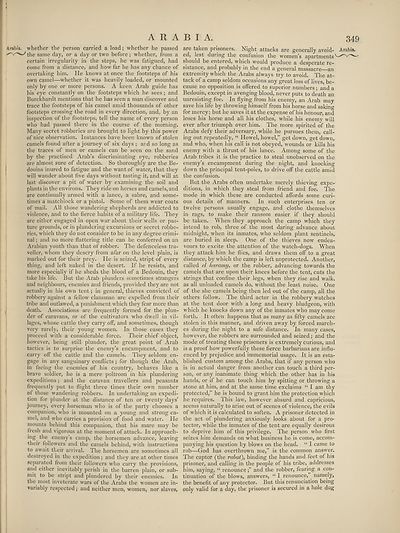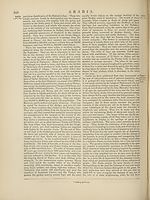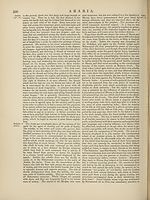Encyclopaedia Britannica > Volume 3, Anatomy-Astronomy
(357) Page 349
Download files
Complete book:
Individual page:
Thumbnail gallery: Grid view | List view

♦
»
A R A
Arabia, whether the person carried a load; whether he passed
the same day, or a day or two before ; whether, from a
certain irregularity in the steps, he was fatigued, had
come from a distance, and how far he has any chance of
overtaking him. He knows at once the footsteps of his
own camel—whether it was heavily loaded, or mounted
only by one or more persons. A keen Arab guide has
his eye constantly on the footsteps which he sees; and
Burckhardt mentions that he has seen a man discover and
trace the footsteps of his camel amid thousands of other
footsteps crossing the road in every direction, and, by an
inspection of the footsteps, tell the name of every person
who had passed there in the course of the morning.
Many secret robberies are brought to light by this power
of nice observation. Instances have been known of stolen
camels found after a journey of six days ; and so long as
the traces of men or camels can be seen on the sand
by the practised Arab’s discriminating eye, robberies
are almost sure of detection. So thoroughly are the Be¬
douins inured to fatigue and the want of water, that they
will wander about five days without tasting it, and will at
last discover a pit of water by examining the soil and
plants in the environs. They ride on horses and camels, and
are continually armed with a lance, a sabre, and some¬
times a matchlock or a pistol. Some of them wear coats
of mail. All those wandering shepherds are addicted to
violence, and to the fierce habits of a military life. They
are either engaged in open war about their wells or pas¬
ture grounds, or in plundering excursions or secret robbe¬
ries, which they do not consider to be in any degree crimi¬
nal ; and no more flattering title can be conferred on an
Arabian youth than that of robber. The defenceless tra¬
veller, whom they descry from afar on the level plain, is
marked out for their prey. He is seized, stript of every
thing, and left naked in the desert. If he resists, and
more especially if he sheds the blood of a Bedouin, they
take his life. But the Arab plunders sometimes strangers
and neighbours, enemies and friends, provided they are not
actually in his own tent; in general, thieves convicted of
robbery against a fellow clansman are expelled from their
tribe and outlawed, a punishment which they fear more than
death. Associations are frequently formed for the plun¬
der of caravans, or of the cultivators who dwell in vil¬
lages, whose cattle they carry off, and sometimes, though
very rarely, their young women. In those cases they
proceed with a considerable force. Their chief object,
however, being still plunder, the great point of Arab
tactics is to surprise the enemy’s encampment, and to
carry off the cattle and the camels. They seldom en¬
gage in any sanguinary conflicts ; for though the Arab,
in facing the enemies of his country, behaves like a
brave soldier, he is a mere poltroon in his plundering
expeditions; and the caravan travellers and peasants
frequently put to flight three times their own number
of those wandering robbers. In undertaking an expedi¬
tion for plunder at the distance of ten or twenty days’
journey, every horseman who is of the party chooses a
companion, who is mounted on a young and strong ca¬
mel, and who carries a provision of food and water. He
mounts behind this companion, that his mare may be
fresh and vigorous at the moment of attack. In approach¬
ing the enemy’s camp, the horsemen advance, leaving
their followers and the camels behind, with instructions
to await their arrival. The horsemen are sometimes all
destroyed in the expedition; and they are at other times
separated from their followers who carry the provisions,
and either inevitably perish in the barren plain, or sub¬
mit to be stript and plundered by their enemies. In
the most inveterate wars of the Arabs the women are in¬
variably respected ; and neither men, women, nor slaves,
B I A. 349
are taken prisoners. Night attacks are generally avoid- Arabia,
ed, lest during the confusion the women’s apartments
should be entered, which would produce a desperate re¬
sistance, and probably in the end a general massacre—an
extremity which the Arabs always try to avoid. The at¬
tack of a camp seldom occasions any great loss of lives, be¬
cause no opposition is offered to superior numbers; and a
Bedouin, except in avenging blood, never puts to death an
unresisting foe. In flying from his enemy, an Arab may
save his life by throwing himself from his horse and asking
for mercy; but he saves it at the expense of his honour, and
loses his horse and all his clothes, while his enemy will
ever after triumph over him. The more spirited of the
Arabs defy their adversary, while he pursues them, call¬
ing out repeatedly, “ Howel, howel,” get down, get down,
and who, when his call is not obeyed, wounds or kills his
enemy with a thrust of his lance. Among some of the
Arab tribes it is the practice to steal unobserved on the
enemy’s encampment during the night, and knocking
down the principal tent-poles, to drive off the cattle amid
the confusion.
But the Arabs often undertake merely thieving expe¬
ditions, in which they steal from friend and foe. The
mode in which these are conducted affords some curi¬
ous details of manners. In such enterprises ten or
twelve persons usually engage, and clothe themselves
in rags, to make their ransom easier if they should
be taken. When they approach the camp which they
intend to rob, three of the most daring advance about
midnight, when its inmates, who seldom plant sentinels,
are buried in sleep. One of the thieves now endea¬
vours to excite the attention of the watch-dogs. When
they attack him he flies, and draws them off to a great
distance, by which the camp is left unprotected. Another,
called el haramy, or the robber, advancing towards the
camels that are upon their knees before the tent, cuts the
strings that confine their legs, when they rise and walk,
as all unloaded camels do, without the least noise. One
of the she camels being then led out of the camp, all the
others follow. The third actor in the robbery watches
at the tent door with a long and heavy bludgeon, with
which he knocks down any of the inmates who may come
forth. It often happens that as many as fifty camels are
stolen in this manner, and driven away by forced march¬
es during the night to a safe distance. In many cases,
however, the robbers are surrounded and seized; and the
mode of treating these prisoners is extremely curious, and
is a proof how powerfully these fierce barbarians are influ¬
enced by prejudice and immemorial usage. It is an esta¬
blished custom among the Arabs, that if any person who
is in actual danger from another can touch a third per¬
son, or any inanimate thing which the other has in his
hands, or if he can touch him by spitting or throwing a
stone at him, and at the same time exclaims “ I am thy
protected,” he is bound to grant him the protection which
he requires. This law, however absurd and capricious,
seems naturally to arise out of scenes of violence, the evils
of which it is calculated to soften. A prisoner detected in
the act of plundering anxiously looks about for a pro¬
tector, while the inmates of the tent are equally desirous
to deprive him of this privilege, The person who first
seizes him demands on what business he is come, accom¬
panying his question by blows on the head. “ I came to
rob—God has overthrown me,” is the common answer.
The captor (the robot), binding the hands and feet ot his
prisoner, and calling in the people of his tribe, addresses
him, saying, “ renounce;” and the robber, fearing a con¬
tinuation of the blows, answers, “ I renounce,” namely,
the benefit of any protector. But this renunciation being
only valid for a day, the prisoner is secured in a hole dug
»
A R A
Arabia, whether the person carried a load; whether he passed
the same day, or a day or two before ; whether, from a
certain irregularity in the steps, he was fatigued, had
come from a distance, and how far he has any chance of
overtaking him. He knows at once the footsteps of his
own camel—whether it was heavily loaded, or mounted
only by one or more persons. A keen Arab guide has
his eye constantly on the footsteps which he sees; and
Burckhardt mentions that he has seen a man discover and
trace the footsteps of his camel amid thousands of other
footsteps crossing the road in every direction, and, by an
inspection of the footsteps, tell the name of every person
who had passed there in the course of the morning.
Many secret robberies are brought to light by this power
of nice observation. Instances have been known of stolen
camels found after a journey of six days ; and so long as
the traces of men or camels can be seen on the sand
by the practised Arab’s discriminating eye, robberies
are almost sure of detection. So thoroughly are the Be¬
douins inured to fatigue and the want of water, that they
will wander about five days without tasting it, and will at
last discover a pit of water by examining the soil and
plants in the environs. They ride on horses and camels, and
are continually armed with a lance, a sabre, and some¬
times a matchlock or a pistol. Some of them wear coats
of mail. All those wandering shepherds are addicted to
violence, and to the fierce habits of a military life. They
are either engaged in open war about their wells or pas¬
ture grounds, or in plundering excursions or secret robbe¬
ries, which they do not consider to be in any degree crimi¬
nal ; and no more flattering title can be conferred on an
Arabian youth than that of robber. The defenceless tra¬
veller, whom they descry from afar on the level plain, is
marked out for their prey. He is seized, stript of every
thing, and left naked in the desert. If he resists, and
more especially if he sheds the blood of a Bedouin, they
take his life. But the Arab plunders sometimes strangers
and neighbours, enemies and friends, provided they are not
actually in his own tent; in general, thieves convicted of
robbery against a fellow clansman are expelled from their
tribe and outlawed, a punishment which they fear more than
death. Associations are frequently formed for the plun¬
der of caravans, or of the cultivators who dwell in vil¬
lages, whose cattle they carry off, and sometimes, though
very rarely, their young women. In those cases they
proceed with a considerable force. Their chief object,
however, being still plunder, the great point of Arab
tactics is to surprise the enemy’s encampment, and to
carry off the cattle and the camels. They seldom en¬
gage in any sanguinary conflicts ; for though the Arab,
in facing the enemies of his country, behaves like a
brave soldier, he is a mere poltroon in his plundering
expeditions; and the caravan travellers and peasants
frequently put to flight three times their own number
of those wandering robbers. In undertaking an expedi¬
tion for plunder at the distance of ten or twenty days’
journey, every horseman who is of the party chooses a
companion, who is mounted on a young and strong ca¬
mel, and who carries a provision of food and water. He
mounts behind this companion, that his mare may be
fresh and vigorous at the moment of attack. In approach¬
ing the enemy’s camp, the horsemen advance, leaving
their followers and the camels behind, with instructions
to await their arrival. The horsemen are sometimes all
destroyed in the expedition; and they are at other times
separated from their followers who carry the provisions,
and either inevitably perish in the barren plain, or sub¬
mit to be stript and plundered by their enemies. In
the most inveterate wars of the Arabs the women are in¬
variably respected ; and neither men, women, nor slaves,
B I A. 349
are taken prisoners. Night attacks are generally avoid- Arabia,
ed, lest during the confusion the women’s apartments
should be entered, which would produce a desperate re¬
sistance, and probably in the end a general massacre—an
extremity which the Arabs always try to avoid. The at¬
tack of a camp seldom occasions any great loss of lives, be¬
cause no opposition is offered to superior numbers; and a
Bedouin, except in avenging blood, never puts to death an
unresisting foe. In flying from his enemy, an Arab may
save his life by throwing himself from his horse and asking
for mercy; but he saves it at the expense of his honour, and
loses his horse and all his clothes, while his enemy will
ever after triumph over him. The more spirited of the
Arabs defy their adversary, while he pursues them, call¬
ing out repeatedly, “ Howel, howel,” get down, get down,
and who, when his call is not obeyed, wounds or kills his
enemy with a thrust of his lance. Among some of the
Arab tribes it is the practice to steal unobserved on the
enemy’s encampment during the night, and knocking
down the principal tent-poles, to drive off the cattle amid
the confusion.
But the Arabs often undertake merely thieving expe¬
ditions, in which they steal from friend and foe. The
mode in which these are conducted affords some curi¬
ous details of manners. In such enterprises ten or
twelve persons usually engage, and clothe themselves
in rags, to make their ransom easier if they should
be taken. When they approach the camp which they
intend to rob, three of the most daring advance about
midnight, when its inmates, who seldom plant sentinels,
are buried in sleep. One of the thieves now endea¬
vours to excite the attention of the watch-dogs. When
they attack him he flies, and draws them off to a great
distance, by which the camp is left unprotected. Another,
called el haramy, or the robber, advancing towards the
camels that are upon their knees before the tent, cuts the
strings that confine their legs, when they rise and walk,
as all unloaded camels do, without the least noise. One
of the she camels being then led out of the camp, all the
others follow. The third actor in the robbery watches
at the tent door with a long and heavy bludgeon, with
which he knocks down any of the inmates who may come
forth. It often happens that as many as fifty camels are
stolen in this manner, and driven away by forced march¬
es during the night to a safe distance. In many cases,
however, the robbers are surrounded and seized; and the
mode of treating these prisoners is extremely curious, and
is a proof how powerfully these fierce barbarians are influ¬
enced by prejudice and immemorial usage. It is an esta¬
blished custom among the Arabs, that if any person who
is in actual danger from another can touch a third per¬
son, or any inanimate thing which the other has in his
hands, or if he can touch him by spitting or throwing a
stone at him, and at the same time exclaims “ I am thy
protected,” he is bound to grant him the protection which
he requires. This law, however absurd and capricious,
seems naturally to arise out of scenes of violence, the evils
of which it is calculated to soften. A prisoner detected in
the act of plundering anxiously looks about for a pro¬
tector, while the inmates of the tent are equally desirous
to deprive him of this privilege, The person who first
seizes him demands on what business he is come, accom¬
panying his question by blows on the head. “ I came to
rob—God has overthrown me,” is the common answer.
The captor (the robot), binding the hands and feet ot his
prisoner, and calling in the people of his tribe, addresses
him, saying, “ renounce;” and the robber, fearing a con¬
tinuation of the blows, answers, “ I renounce,” namely,
the benefit of any protector. But this renunciation being
only valid for a day, the prisoner is secured in a hole dug
Set display mode to:
![]() Universal Viewer |
Universal Viewer | ![]() Mirador |
Large image | Transcription
Mirador |
Large image | Transcription
Images and transcriptions on this page, including medium image downloads, may be used under the Creative Commons Attribution 4.0 International Licence unless otherwise stated. ![]()
| Encyclopaedia Britannica > Encyclopaedia Britannica > Volume 3, Anatomy-Astronomy > (357) Page 349 |
|---|
| Permanent URL | https://digital.nls.uk/193761989 |
|---|
| Attribution and copyright: |
|
|---|---|
| Shelfmark | EB.16 |
|---|---|
| Description | Ten editions of 'Encyclopaedia Britannica', issued from 1768-1903, in 231 volumes. Originally issued in 100 weekly parts (3 volumes) between 1768 and 1771 by publishers: Colin Macfarquhar and Andrew Bell (Edinburgh); editor: William Smellie: engraver: Andrew Bell. Expanded editions in the 19th century featured more volumes and contributions from leading experts in their fields. Managed and published in Edinburgh up to the 9th edition (25 volumes, from 1875-1889); the 10th edition (1902-1903) re-issued the 9th edition, with 11 supplementary volumes. |
|---|---|
| Additional NLS resources: |
|

